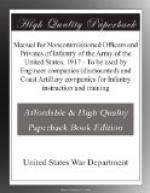Immediately after breakfast men police their tents and raise walls of same. If the day is fair, all bedding should be spread on the tents for several hours’ airing.
At sick call all men who are sick fall in and are marched to the regimental infirmary, under charge of the noncommissioned officer in charge of quarters. The noncommissioned officer takes with him the company sick report previously filled in and signed by the company commander. The surgeon examines all those reporting and indicates their status on the sick report. This status may be “Duty” (available for all duty), “Quarters” (patient to remain in tent or company street), and “Hospital” (patient to be sent to the hospital). The noncommissioned officer then returns to the company with all the men not marked “Hospital” and hands the sick report to the first sergeant.
At “Drill call” the company prepares for drill and falls in so that it will be completely formed at assembly, which is usually sounded 10 minutes after drill call. All men are required to attend drill except those excused by sick report and those specially excused from headquarters. The excused list should include in each company only the mess sergeant, the two cooks, one kitchen police, and men on regimental guard. During drill hours the guard to be excused should be limited to a small patrol to guard against fire and thieves in camp.
If the bedding has been aired, it should be taken in immediately after drill and placed in the tents neatly folded.
Some time during the morning, at a time designated by him, the company commander inspects the entire company camp. At this inspection the entire street should be policed, kitchen in order, and tents policed, as follows:
In permanent camp, when pyramidal, conical, or wall tents are used: Bedding folded neatly and placed on the head of the cot. (If bed sacks are used, they will be folded in three folds and the bedding placed on top.) Hats on top of the bedding. Shoes under foot of cot. Surplus kit bag at side of squad leader’s cot. Equipment suspended neatly from a frame arranged around the tent pole. Rifles in rack constructed around the tent pole.
In shelter-tent camp: Bedding neatly folded and placed at rear of tent, ponchos underneath. Equipment arranged on the bedding. Rifles laid on bedding except when used as tent poles.
The regimental commander prescribes the exact scheme to be followed in the police of tents.
Should there be no parade, retreat roll call is held at the same hour. This roll call is under arms and is supervised by an officer of the company. After the roll call and at the sounding of “Retreat,” the officer brings the company to parade rest and keeps it in this position during the sounding of this call. At the first note of the National Anthem ("The Star-Spangled Banner”) or “To the Color” the company is brought to attention and so stands until the end of the playing. The officer then reports the result of the roll call to the adjutant or officer of the day, returns to the company, inspects the arms, and dismisses it.




